Lifting and Moving Victims Noor Adelynna Shaqeeraz Bt

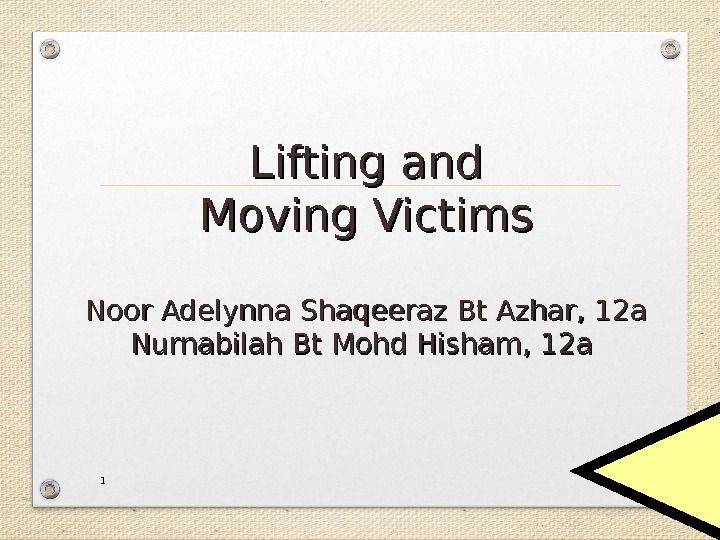
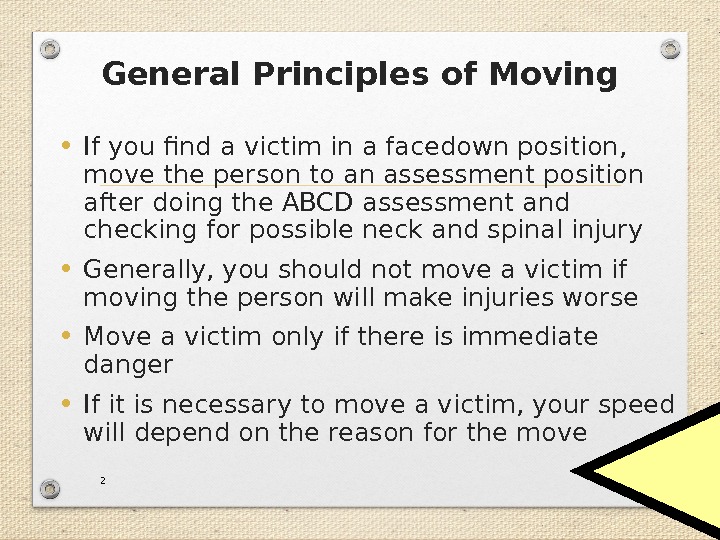
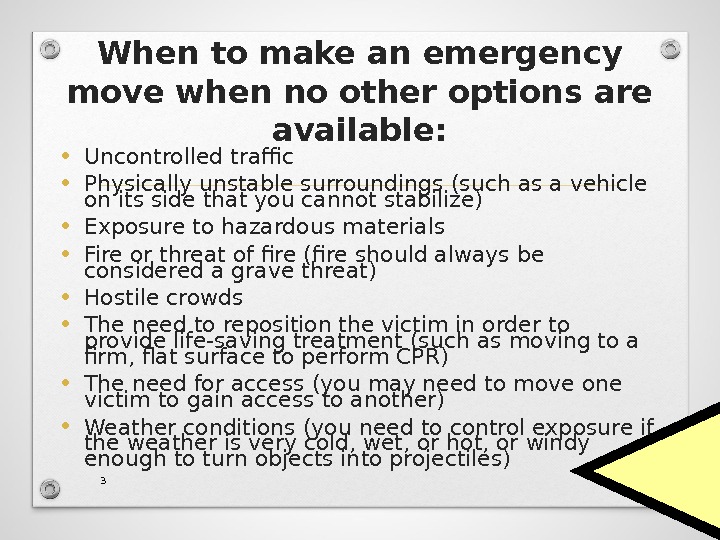


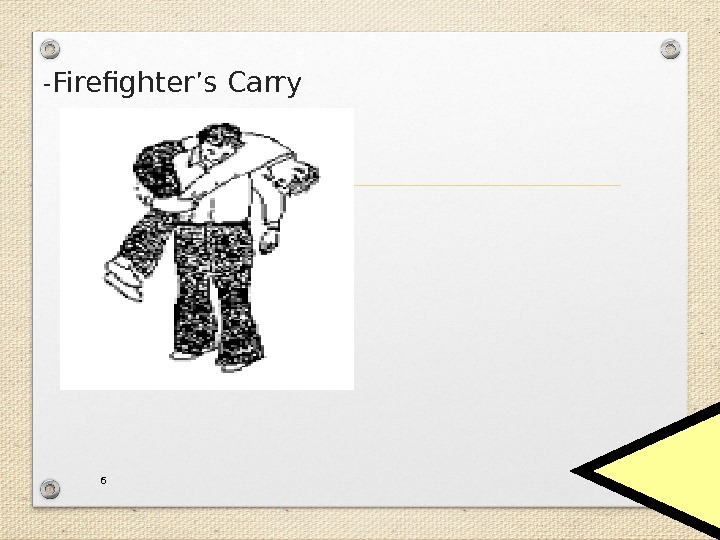
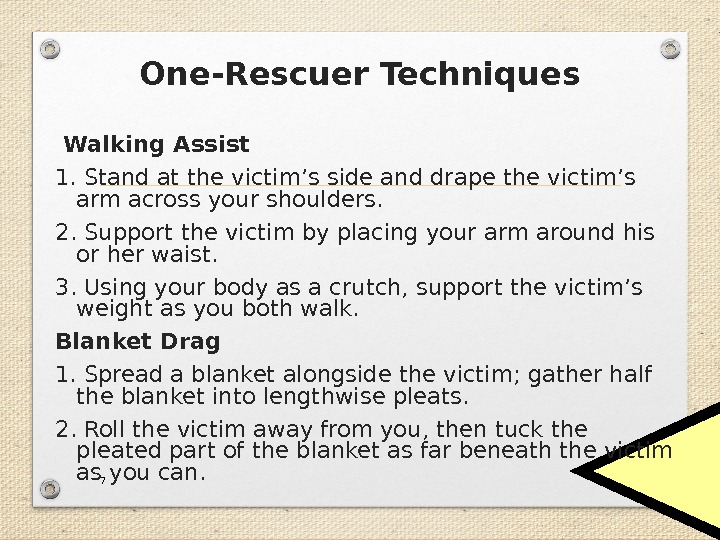



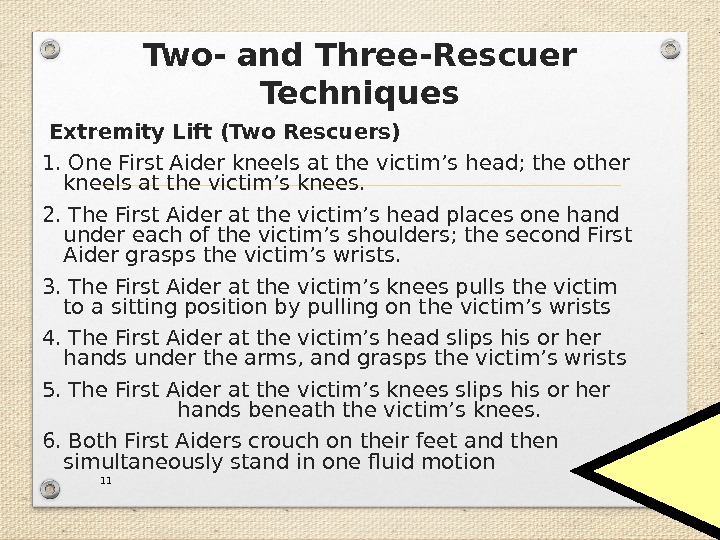
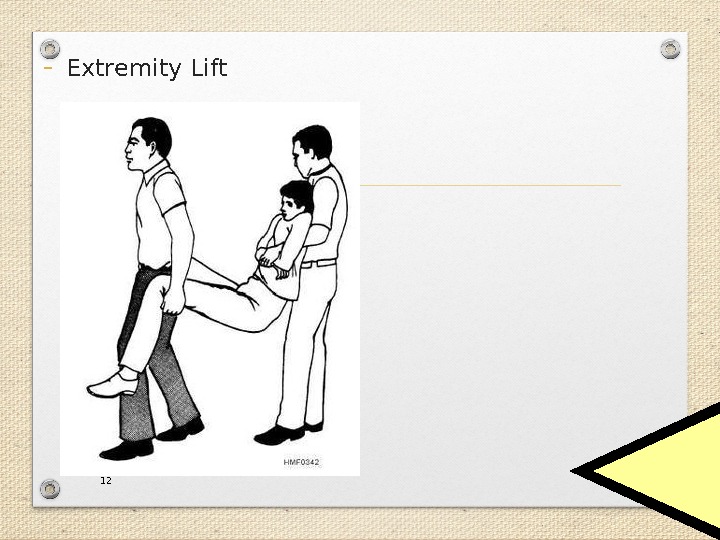
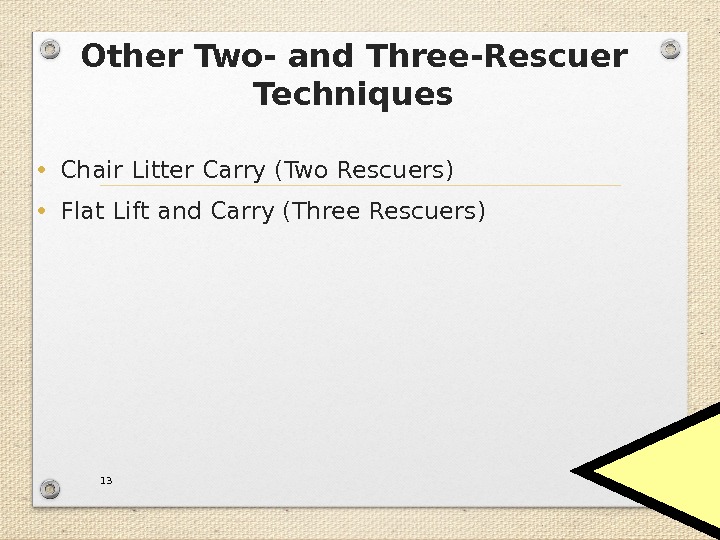

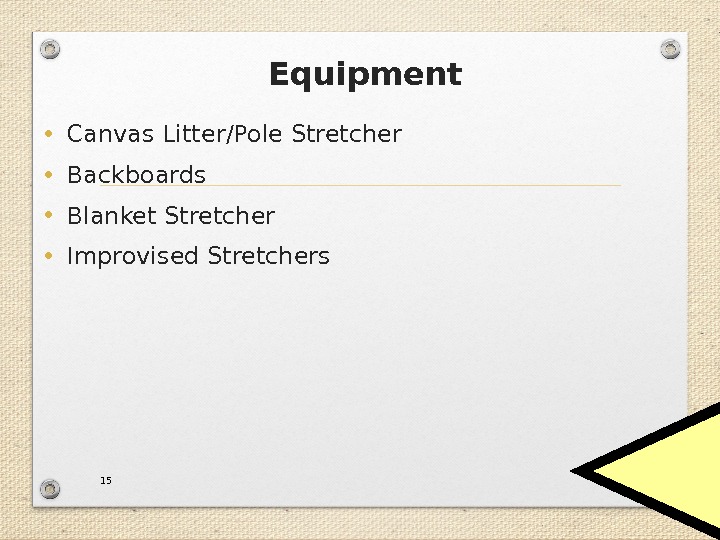

lifting_amp_moving_victims_slides.ppt
- Размер: 13 Mегабайта
- Количество слайдов: 16
Описание презентации Lifting and Moving Victims Noor Adelynna Shaqeeraz Bt по слайдам
 Lifting and Moving Victims Noor Adelynna Shaqeeraz Bt Azhar , 12 а Nurnabilah Bt Mohd Hisham , 12 а
Lifting and Moving Victims Noor Adelynna Shaqeeraz Bt Azhar , 12 а Nurnabilah Bt Mohd Hisham , 12 а
 General Principles of Moving • If you find a victim in a facedown position, move the person to an assessment position after doing the ABCD assessment and checking for possible neck and spinal injury • Generally, you should not move a victim if moving the person will make injuries worse • Move a victim only if there is immediate danger • If it is necessary to move a victim, your speed will depend on the reason for the move
General Principles of Moving • If you find a victim in a facedown position, move the person to an assessment position after doing the ABCD assessment and checking for possible neck and spinal injury • Generally, you should not move a victim if moving the person will make injuries worse • Move a victim only if there is immediate danger • If it is necessary to move a victim, your speed will depend on the reason for the move
 When to make an emergency move when no other options are available: • Uncontrolled traffic • Physically unstable surroundings (such as a vehicle on its side that you cannot stabilize) • Exposure to hazardous materials • Fire or threat of fire (fire should always be considered a grave threat) • Hostile crowds • The need to reposition the victim in order to provide life-saving treatment (such as moving to a firm, flat surface to perform CPR) • The need for access (you may need to move one victim to gain access to another) • Weather conditions (you need to control exposure if the weather is very cold, wet, or hot, or windy enough to turn objects into projectiles)
When to make an emergency move when no other options are available: • Uncontrolled traffic • Physically unstable surroundings (such as a vehicle on its side that you cannot stabilize) • Exposure to hazardous materials • Fire or threat of fire (fire should always be considered a grave threat) • Hostile crowds • The need to reposition the victim in order to provide life-saving treatment (such as moving to a firm, flat surface to perform CPR) • The need for access (you may need to move one victim to gain access to another) • Weather conditions (you need to control exposure if the weather is very cold, wet, or hot, or windy enough to turn objects into projectiles)
 One-Rescuer Techniques • Walking Assist • Blanket Drag • Shirt Drag • Sheet Drag • Firefighter’s Carry
One-Rescuer Techniques • Walking Assist • Blanket Drag • Shirt Drag • Sheet Drag • Firefighter’s Carry
 -Walking Assist -Shirt Drag -Blanket Drag -Sheet Drag
-Walking Assist -Shirt Drag -Blanket Drag -Sheet Drag
 — Firefighter’s Carry
— Firefighter’s Carry
 One-Rescuer Techniques Walking Assist 1. Stand at the victim’s side and drape the victim’s arm across your shoulders. 2. Support the victim by placing your arm around his or her waist. 3. Using your body as a crutch, support the victim’s weight as you both walk. Blanket Drag 1. Spread a blanket alongside the victim; gather half the blanket into lengthwise pleats. 2. Roll the victim away from you, then tuck the pleated part of the blanket as far beneath the victim as you can.
One-Rescuer Techniques Walking Assist 1. Stand at the victim’s side and drape the victim’s arm across your shoulders. 2. Support the victim by placing your arm around his or her waist. 3. Using your body as a crutch, support the victim’s weight as you both walk. Blanket Drag 1. Spread a blanket alongside the victim; gather half the blanket into lengthwise pleats. 2. Roll the victim away from you, then tuck the pleated part of the blanket as far beneath the victim as you can.
 One-Rescuer Techniques Shirt Drag 1. Fasten the victim’s hands or wrists loosely together, then link them to the victim’s belt or pants to keep the arms from flopping or coming out of the shirt. 2. Grasp the shoulders of the victim’s shirt under the head; use your forearms to support both sides of the head. 3. Using the shirt as a handle, pull the victim toward you; the pulling power should engage the victim’s armpits, not the neck. Sheet Drag 1. Fold a sheet several times lengthwise to form a narrow, long “harness”; lay the folded sheet centered across the victim’s chest at the nipple line. 2. Pull the ends of the sheet under the victim’s arms at the armpits and behind the victim’s head; twist the ends of the sheet together to form a triangular support for the head. Be careful not to pull the victim’s hair. 3. Grasping the loose ends of the sheet, pull the victim toward you.
One-Rescuer Techniques Shirt Drag 1. Fasten the victim’s hands or wrists loosely together, then link them to the victim’s belt or pants to keep the arms from flopping or coming out of the shirt. 2. Grasp the shoulders of the victim’s shirt under the head; use your forearms to support both sides of the head. 3. Using the shirt as a handle, pull the victim toward you; the pulling power should engage the victim’s armpits, not the neck. Sheet Drag 1. Fold a sheet several times lengthwise to form a narrow, long “harness”; lay the folded sheet centered across the victim’s chest at the nipple line. 2. Pull the ends of the sheet under the victim’s arms at the armpits and behind the victim’s head; twist the ends of the sheet together to form a triangular support for the head. Be careful not to pull the victim’s hair. 3. Grasping the loose ends of the sheet, pull the victim toward you.
 One-Rescuer Techniques Firefighter’s Carry 1. Position the victim on his or her back with both knees bent and raised; grasp the back sides of the victim’s wrists. 2. Stand on the toes of both the victim’s feet; lean backward and pull the victim up toward you. 3. As the victim nears a standing position, crouch slightly and pull the victim over your shoulder, then stand upright. 4. Pass your arm between the victim’s legs and grasp the victim’s arm that is nearest your body.
One-Rescuer Techniques Firefighter’s Carry 1. Position the victim on his or her back with both knees bent and raised; grasp the back sides of the victim’s wrists. 2. Stand on the toes of both the victim’s feet; lean backward and pull the victim up toward you. 3. As the victim nears a standing position, crouch slightly and pull the victim over your shoulder, then stand upright. 4. Pass your arm between the victim’s legs and grasp the victim’s arm that is nearest your body.
 Two- and Three-Rescuer Techniques Seat Carries (Two Rescuers) 1. Raise the victim to a sitting position; each First Aider steadies the victim by positioning an arm around the victim’s back. 2. Each First Aider slips his or her other arm under the victim’s thighs, then clasps the wrist of the other First Aider. 3. Slowly raise the victim from the ground, moving in unison.
Two- and Three-Rescuer Techniques Seat Carries (Two Rescuers) 1. Raise the victim to a sitting position; each First Aider steadies the victim by positioning an arm around the victim’s back. 2. Each First Aider slips his or her other arm under the victim’s thighs, then clasps the wrist of the other First Aider. 3. Slowly raise the victim from the ground, moving in unison.
 Two- and Three-Rescuer Techniques Extremity Lift (Two Rescuers) 1. One First Aider kneels at the victim’s head; the other kneels at the victim’s knees. 2. The First Aider at the victim’s head places one hand under each of the victim’s shoulders; the second First Aider grasps the victim’s wrists. 3. The First Aider at the victim’s knees pulls the victim to a sitting position by pulling on the victim’s wrists 4. The First Aider at the victim’s head slips his or her hands under the arms, and grasps the victim’s wrists 5. The First Aider at the victim’s knees slips his or her hands beneath the victim’s knees. 6. Both First Aiders crouch on their feet and then simultaneously stand in one fluid motion
Two- and Three-Rescuer Techniques Extremity Lift (Two Rescuers) 1. One First Aider kneels at the victim’s head; the other kneels at the victim’s knees. 2. The First Aider at the victim’s head places one hand under each of the victim’s shoulders; the second First Aider grasps the victim’s wrists. 3. The First Aider at the victim’s knees pulls the victim to a sitting position by pulling on the victim’s wrists 4. The First Aider at the victim’s head slips his or her hands under the arms, and grasps the victim’s wrists 5. The First Aider at the victim’s knees slips his or her hands beneath the victim’s knees. 6. Both First Aiders crouch on their feet and then simultaneously stand in one fluid motion
 — Extremity Lift
— Extremity Lift
 Other Two- and Three-Rescuer Techniques • Chair Litter Carry (Two Rescuers) • Flat Lift and Carry (Three Rescuers)
Other Two- and Three-Rescuer Techniques • Chair Litter Carry (Two Rescuers) • Flat Lift and Carry (Three Rescuers)
 — Chair litter carry Flat lift and carry
— Chair litter carry Flat lift and carry
 Equipment • Canvas Litter/Pole Stretcher • Backboards • Blanket Stretcher • Improvised Stretchers
Equipment • Canvas Litter/Pole Stretcher • Backboards • Blanket Stretcher • Improvised Stretchers
 16 Thank you for your attention!
16 Thank you for your attention!

